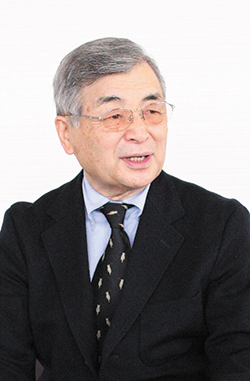
Professor Gary Hoichi Tsuchimochi
Higher Education teaching method (faculty development)
Comparative Education, History of Postwar Educational Reform
Liberal Arts expert
Bachelor of Arts and Master of Arts, California State University (USA); Master of East Asian Studies, Master of Education (Ed. M.), Doctor of Education (Ed. D.), Columbia University, USA; Doctor of Education, University of Tokyo Former Guest Professor, Department of Education, University of Victoria (Canada); Guest Research Fellow, Mark T. Orr Center for Japanese Studies, University of South Florida; Guest Professor, Center for the Studies of Higher Education, Nagoya University; Examining Professor, Ministry of Education, Culture, Sports, Science and Technology (MEXT), University Establishment Council; Former Professor of Human Sciences, Graduate School, Toyo Eiwa Women’s University; Former Professor, 21st Century Education Center, Hirosaki University; Former Professor, Teikyo University; Former Director, Center for Teaching and Learning, Teikyo University; Former University Management Consultant (President of 21st Century College Management Consulting)
Professor Gary Tsuchimochi, Professor of Educational Philosophy (Teaching Philosophy), teaches students and classes at The Kyoto Graduate School of Information Science. KCGI students are encouraged to form a learning community that creates learning portfolios.
Find a way to be free from preconceptions
The original purpose of education is to be a "catalyst" for students' learning
-Please explain your educational philosophy specifically in each section.
-Why should we be free from preconceptions?
Preconceptions make it difficult to think flexibly and freely. Because our school is a place to learn the latest technology such as IT, especially AI, creativity is required.
-What is the difference between studying and learning?
Up until now, school learning has been passive, and emphasis has been placed on studying what has been taught. In other words, "input" was emphasized in learning. Graduate school education is a place where no one teaches you and you ask questions to yourselves and learn. This is the origin of the word "scholarship". Learning by asking is the basis of adult learning. It emphasizes "Outputs" in learning.
-What is Project-based Learning?
Now on, our society will require more of Project-based Learning. In order to create new things, discovery is necessary. "Questioning" is essential for discovery. There is a limit to "ask" alone. In other words, team learning is more necessary than group learning. This is called TBL and is increasingly replacing PBL.
-What is a learning environment?
Learning changes in the learning environment. Teaching is not the only job of a teacher. Teachers must be facilitators. This depends on whether you think of teaching as "Kyoiku" (To teach and nurture) or "Education". The former is Japanese, and the latter is American.
-What is liberal arts?
This is the essence of university education. I used to associate liberal arts with humanity/social science majors. However, it has become emphasized that liberal arts are even more necessary for science majors. For example, a new liberal arts center was established at the Tokyo Institute of Technology, and former NHK reporter Akira Ikegami became a professor. This is also true of the famous MIT located in the Eastern United States. Wesley College, which former Secretary of State H. Clinton graduated and also famous as the movie 'Mona Lisa Smile' location, is one of America's leading women's science colleges and also famous as a leading liberal arts college. I introduced their "freshman seminar" to Japan.
-What is basic social skills?
"Basic social skills" is a term often used in universities and companies. Books are also published about it. In such a book, my teaching practice is included, as the critical thinking skills of liberal arts are considered to be a basic skill for working adults.
-Can it coexist with AI?
By 2045, AI (artificial intelligence) is said to become dominant over human beings in the world according to some news, and there is a sense of crisis that AI will replace human occupations. I participated in a corporate education and training program conducted by a major electrical equipment manufacturer as part of the industry-academia collaboration project "on-the-job training of university teachers" of the secretariat of Japan Universities Association for Computer Education. The company is also at the forefront of AI technology, and even German Chancellor Angela Merkel (Ph.D. in Physics) visited. We emphasized the need to coexist with AI, not "confront" with it. In other words, it is the integration of scientific technology and human education.
-How do you learn to learn?
Both MIT and Wesley College focus on teaching autonomous learning called "learn how to learn". This is the essence of liberal arts colleges.
-What is Daisha (university-society) Collaboration?
This is my "coined word" but universities and graduate schools in the future will need to cooperate with society (companies). This requires the training of autonomous learners.
-Education Philosophy of the KCG Group
Every university has three policies: Admissions, Curriculum and Diploma. The educational philosophy of Kyoto Computer College (KCG), the parent organization of our school, includes "Cultivation of creative abilities in computer technology" and "Cultivation of the ability to think compulsively in the information society". Indeed, it can be said that this is indeed the integration of science and arts (liberal arts).
Using IT to Challenge the Unknown World
Please give a message to students.
Our students have a better learning environment than anyone else. This is because it is easy to acquire specialized knowledge in IT, and by making full use of it, we can boldly challenge the unknown world. My dream is to create a learning community that values communication with our students and "create" learner-centered classes together. Please help me realize my dream.